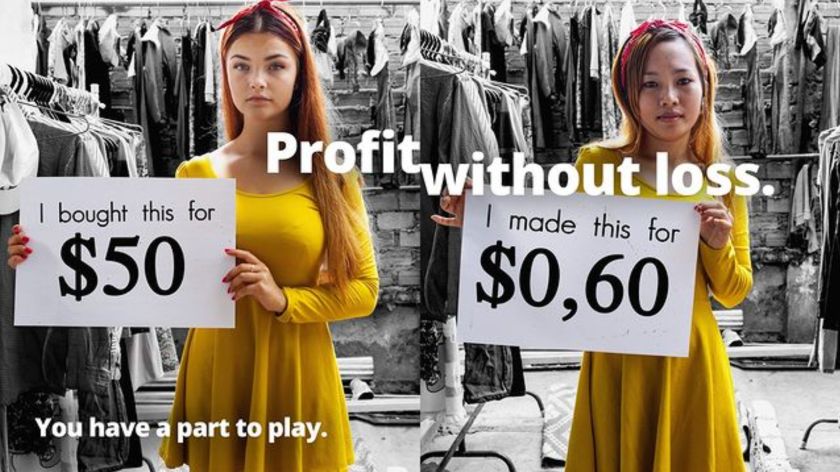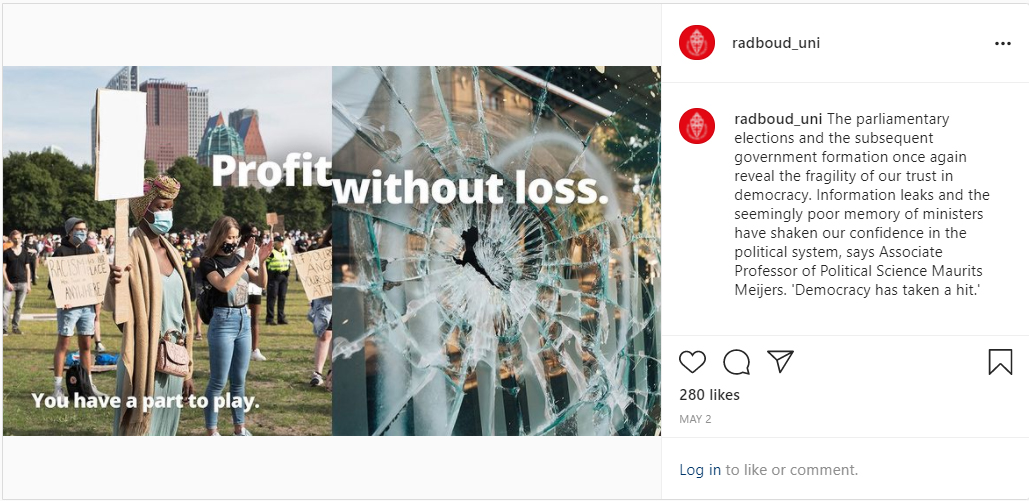The university as saviour of the world. How realistic is this image?
-
 Een campagne van de Radboud Universiteit van eerder dit jaar, waarin ook nadrukkelijk een maatschappelijke positie ingenomen werd.
Een campagne van de Radboud Universiteit van eerder dit jaar, waarin ook nadrukkelijk een maatschappelijke positie ingenomen werd.
The plastic soup has to go, everyone should earn fair wages, and Radboud University will teach you how to make it happen. Or at least, that is the image propagated by the university in its advertising campaigns. But is it true? ‘You have no choice but to deliver on your promises,’ says Marketing Director Pim van Zanen.
An Instagram post shows a young woman wearing a yellow dress holding up a sign that says: ‘I bought this for $50’. On her right, a girl wearing the same dress also holding a sign: ‘I made this for $0.60’. The caption beneath reads: ‘You have a part to play’.
You might not immediately link this post to Radboud University, and yet it came straight out of the university’s marketing sleeve. If you scroll through the university’s Instagram feed of the past months, or look at the advertisements it published in the newspapers, you’ll see, in addition to the girl-in-a-dress, an appeal to influencers, a sea turtle caught in a fishing net and a photo of an anti-racism demonstration.
It might as well have been an ad for Greenpeace or Amnesty International. Which is exactly the intention, says Pim van Zanen, Director of Marketing and Communications at Radboud University. ‘In 2019, we asked ourselves: How do we position a university as broad as Radboud University?’ he says. This discussion played an important role in creating a university-wide strategy titled ‘A Significant Impact,’ which resulted in these recent advertisements. However, this begs the question of how honest the message behind these advertisements actually is.
You have to admit that the words that first come to mind when you see this campaign are: save the world.
‘It’s true that it addresses the question: What is all our teaching and research for? Ultimately, we want to contribute to a better society. In their marketing campaigns, many universities emphasise how good they are. It’s all ‘excellent’ this, and ‘excellent’ that. We prioritise the social issues.’
Do ‘we’ really want to contribute to a better society? Is that what everyone at Radboud University wants in your opinion?
‘I don’t know if it’s what everyone wants, but I do notice that many people recognise themselves in this campaign, which got very positive responses. We’ve received messages like: ‘I always felt a kind of pride, but now I really feel that “Yes! This is where I belong, and this is what I want to contribute to.”’

Van Zanen mentions the 2019 Radboud video of a burning globe – which was screened in a number of cinemas. ‘That may have been dramatic and over the top, but it got the message across. Next autumn we will release a new video. I guess you could call it dramatic too,’ he says. ‘While other universities appeal to the rational mind, we appeal to the emotions. That’s what makes Radboud University stand out.’
It certainly does stand out, but are these messages actually true? On Instagram, it says in the university’s bio: ‘Radboud University contributes to a free and healthy world with equal opportunities for all.’ It doesn’t sound at all as if you’re talking about a university.
‘That statement adds extra weight and depth to the role our lecturers and researchers play in this process. For example, the university is planning to include sustainability in every curriculum, which means it will affect all students.’
Ultimately, the university doesn’t only produce social reformers. And not everyone will end up working for Greenpeace.
‘What you say is true, but by emphasising this aspect, we also attract a particular type of student: those who resonate with our message. I think we already have the identity we express in the campaign, and this will only make it stronger. I wonder whether someone who has no interest whatsoever in the climate and only cares about money would be attracted to our message and choose us.’
I don’t immediately associate sustainability with Radboud University.
‘That means that the campaign hasn’t quite done its work yet.’
Traditionally, Radboud University hasn’t had a particularly sustainable image, unlike Wageningen University for example.
‘I think our focus is mostly social. It’s certainly not only about sustainability. Emancipation, diversity, defending the rights of minorities, all that is part of our identity. For example, if you look at AI, you see that at Radboud University, the ethical aspect plays a much greater role than at a technical university.’
The new campaign also highlights the disadvantages of economic growth. The slogan ‘profit without loss’ is one example of this. Is this really what the Nijmegen School of Management is working on?
‘In formulating the strategy, we asked each faculty to name one example of research that made a difference to society. “What makes you stand out?” This gave us the materials for the social engagement angle. For many of our study programmes, social engagement is part of their DNA. And I agree with you: we have no choice but to deliver on our promises.’
And do you deliver on those?
‘What you see in this campaign is what the faculties say about themselves. What we did was link this information to a creative concept. Not the other way around. And as far as broader support is concerned, the faculties made efforts to involve all faculty staff.’

Another example from the campaign is about the position of women and the gender pay gap. And yet, only 30% of Radboud professors are women. Is this not a case of seducing people with a great slogan that doesn’t match the reality at the university?
‘If we weren’t doing anything to change it, then maybe. But we have lots of programmes that try to address this disbalance. And a year ago we hired a diversity officer.’
A year is not such a long time compared to some other universities. The University of Amsterdam has had a diversity officer since 2017.
‘It’s not that we score best in all aspects. But I think this only makes our message bolder and more important. The message itself has a certain effect. By saying it, you commit to doing it. It would be kind of impossible now to hire anyone but a woman to replace Wilma de Koning (former member of the Executive Board, eds.).’
You said you got mostly positive responses to the campaign?
‘There’s always a group, mostly researchers, who doesn’t think a university should do this kind of marketing at all. They would much rather shut our department down altogether so all the money can go directly to the primary process. This campaign only garnered a handful of such responses, which is quite exceptional.’
You’re saying that by adopting this kind of image, the university attracts certain types of people. But doesn’t it also repel others?
‘The campaign is not intended to create obstacles. But the stronger you communicate what you stand for, the better potential employees or students are able to make a choice. If the effect of the message is that it attracts some people more than others, I don’t think that’s a problem.’



